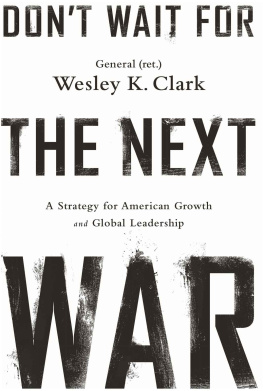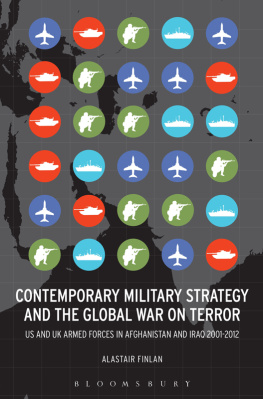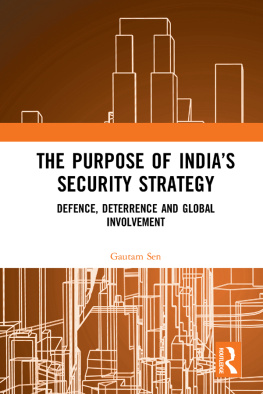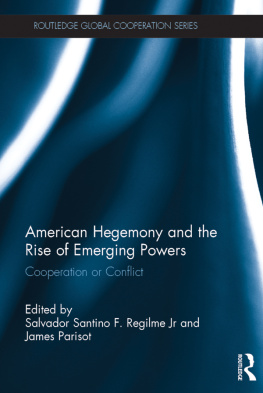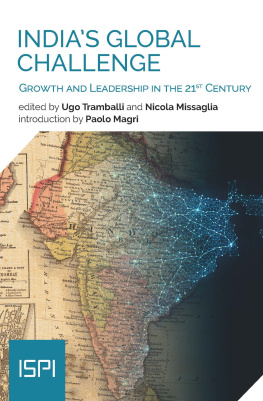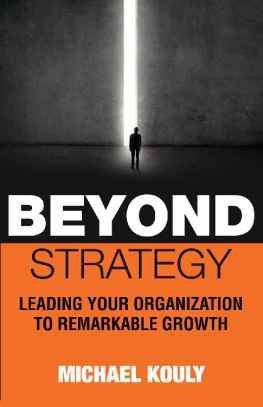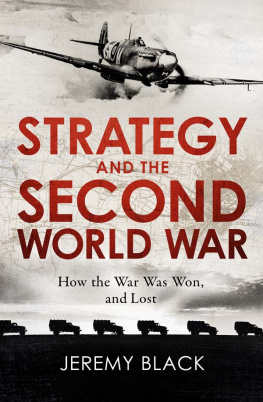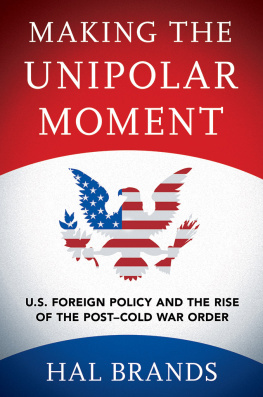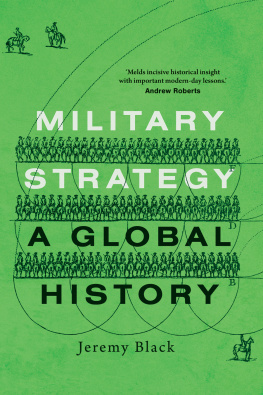DON'T WAIT FOR THE NEXT WAR
ALSO BY GENERAL (RET.) WESLEY K. CLARK
Waging Modern War: Bosnia, Kosovo, and the Future of Combat
Winning Modern Wars: Iraq, Terrorism, and the American Empire
A Time to Lead: For Duty, Honor, and Country (with Tom Carhart)
Copyright 2014
Published in the United States by PublicAffairs,
a Member of the Perseus Books Group
All rights reserved.
Printed in the United States of America.
No part of this book may be reproduced in any manner whatsoever without written permission except in the case of brief quotations embodied in critical articles and reviews. For information, address PublicAffairs, 250 West 57th Street, 15th Floor, New York, NY 10107.
PublicAffairs books are available at special discounts for bulk purchases in the U.S. by corporations, institutions, and other organizations. For more information, please contact the Special Markets Department at the Perseus Books Group, 2300 Chestnut Street, Suite 200, Philadelphia, PA 19103, call (800) 810-4145, ext. 5000, or e-mail special.markets@perseusbooks.com.
Library of Congress Cataloging-in-Publication Data
Clark, Wesley K.
Dont wait for the next war : a strategy for American growth and global leadership / Wesley K. Clark.
pages cm
Includes bibliographical references and index.
ISBN 978-1-61039-433-8 (hardback) ISBN 978-1-61039-434-5 (e-book)
1. National securityUnited States. 2. StrategyUnited States. 3. United StatesPolitics and government21st century. 4. United StatesMilitary policy. 5. United StatesForeign relations. 6. World politics--21st century. 7. Security, International. I. Title. II. Title: Rethinking Americas global mission.
UA23.C5588 2014
355.033573dc23
2014024152
First Edition
10 9 8 7 6 5 4 3 2 1
This book is dedicated to American veterans, who have served both in war and in peace. For more than a century they have borne personally the weight of Americas strategy, in its successes and in its failures. In their honor, it is time for the United States to create an effective national strategy before the next war compels us to do so.
CONTENTS
Gathered around a dinner table, sipping their drinks and glancing at the menus, were members of the Syrian opposition: a young businessman from Chicago, a mild-mannered professor from the University of Arkansas, another younger man who had flown in from London, a local associate, and a couple of others. They were in Los Angeles in April 2013 looking for American supportmoney, friends, influence, and understanding.
Most lived in the United States, some had grown up here; all knew what America stood for: freedom, democracy, opportunity. This was why they, or their families before them, had emigrated here in the first place, and this was precisely what they wanted to take home to Syria. They also knew that America was incredibly strong economically, rich with technology, capital, and promise, and they were very much aware of what our armed forces were capable of. None of them had served in uniform, but they had a profound respect for US military power, and in particular for what our Air Force could do to help their situation at home.
The situation in Syria was, of course, murderous. It was the spring of 2013, and the death toll in that nation had just surpassed 100,000. I was also at the table that night. I had been invited by an associate who had broad business relationships in the Middle East because of my background and general interest in issues of war and diplomacy. Ultimately, while the Syrians wanted support from the US government, they were also looking for friends and whatever forms of assistance might be available outside of government sources.
So we talked about the struggles of a group of brave men and women to resist a tyrannical and brutal regime. The stunning death toll was only the beginning; millions of Syrians had been driven from their homes, and refugees were flooding into neighboring states to escape the fighting. Turkey, Lebanon, and Jordan were all affected. Saudi Arabia, Qatar, and perhaps Turkey were providing the opposition with weapons, but it wasnt enough.
According to the opposition, the regime was directing the Syrian forces to limit the killing to no more than five hundred persons per day in order to temper the international outcry and fend off forcible intervention. It was constantly testing and probing the international communitys tolerance. What could Bashar al-Assads regime get away with? How much brutality could it apply before the world took action? And to complicate things even further, outsiders, including Iran and its political-military arm in the region, Hezbollah, were now involved in the fighting, too.
As the talk around the table continued, I thought about all the representatives of other groups around the world that had looked to America for assistancepeople I had known who had undergone similar struggles in their pursuit of freedom.
First, there was Haiti. In 1994, as director of strategic plans and policy for the Joint Chiefs of Staff, I had heard the Haitians talk about the repressive junta led by General Raoul Cdrason an island, a few murders could be a very effective form of intimidation. I had been among those who had helped then-president Jean-Bertrand Aristide return to government.
Then Bosnia. In 19941995 I had met extensively with Bosnian Muslims and Croats. As a member of Richard Holbrookes diplomatic team charged with ending the conflict, I recalled Haris Silajdi, then the number-two man in the Bosnian Muslim government, remarking, in the back of a bombed-out building in Mostar, I can understand why the Serbs would torture a grown man, but a five-year-old boy? Any torture was shocking and repellant to me. That war finally came to an end when the United States helped to negotiate an agreement in late 1995.
In the late 1990s, as Serb repression in Kosovo grew, I had heard the concerns of leaders in Eastern Europe and the Baltic states as they emerged from Soviet occupation and sought membership in the North Atlantic Treaty Organization (NATO). President Lennart Meri of Estonia told me about the brutal Soviet occupation in Lapland during the 1930swomen had been mutilated and children fed to wild, starving sled dogs as the Laplanders resisted the imposition of communism. I had been shown a picture of an old man with a pistol to his headhe was the last of the Forest Brothers, men who had been executed in Estonia in 1979 by the KGB, after some thirty-five years of resistance. I had met with the Albanians in 1998, and with the Kosovar Albanians in 1998 and 1999, and I had seen the reports of the Serb mortars falling on Kosovo civilians. A whole familyabout 60 men, women, and childrenhad been murdered. I had heard the Kosovar Albanians speak of their fierce determination to break free of the Serbs. Ultimately, NATO fought a warwe called it the Kosovo Air Campaign, to avoid the term warto end Serb ethnic cleansing there.
Even as a retired General Officer (thats what we call ourselves), I was still occasionally contacted and entreated by individuals and groups around the world seeking a better life for themselves and their families. They knew my reputation from my thirty-eight years of service to the United States Army, during which I led NATOs 1999 operations against Serbia as NATO Supreme Allied Commander, and later, my run for the Democratic presidential nomination in 20032004. I had spoken with the Iraqi diaspora in 20022003, for example, and with parents of Egyptian protesters in 2011. I had spoken with Libyans working to overthrow Muammar al-Qaddafi, with the members of the Peoples Mujahedin of Iran (MEK), and now, the Syrians. They were all earnest and brave men and women who wanted a life of freedom and greater opportunitya life worth fighting for. But they were overmatched, and they wanted our help.
Next page
